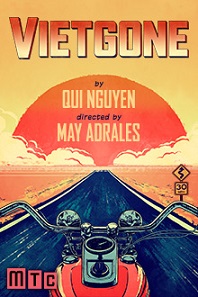♣♣♣♣♣/♣♣♣♣♣
70’s,
Fall of Saigon. Quang (Raymond Lee), a helicopter pilot of the US-backed regime
in South Vietnam, flies a chopper full of his countrymen to safety as the
Vietcong breach their defenses and march south. Unable to take his wife and two
children that he has not seen for a long time, he is transported to safety to a
refugee center in Arkansas. Tong (Jennifer Ikeda) works for the US embassy, and
gets two flight tickets to America, forcing her to choose between her antagonistic
mother and the younger brother he considers to be her best friend. Despite
leaving behind their significant others in the uncertainty of the now communist-occupied
south, sparks fly when the two see each other at Fort Chaffee. But their
romance is going to be short-lived, because he is going back to Saigon, no
matter what it takes, to rescue his kids.
Oh,
it’s like Miss Saigon too, but more edgy yet not that heavy. I’ve read one
review calling Vietgone as the rom-com antidote to Cameron Mackintosh’s West
End classic, but this does not really come off as detrimental to either one. Miss
Saigon is based on Madama Butterfly. It’s SUPPOSED to be tragic. In a sense, its
tragedy is indeed poison wrapped in a packaging so eye-catching and beautiful
that you are left with no choice but to drink and enjoy it before dying from
all the heartache everything from the songs to the plot will give you. On the
contrary, Vietgone focuses more on the refugee experience. The two have the
Vietnam War as their backdrop, but both are stories of love in the midst of misfortune,
told through two distinct musical genres that have their own pros and cons.
Yes,
this is a musical, sort of. BUT wait, there’s more... They don’t sing. THEY
RAP. When Ikeda emerges onstage and begins rapping about her new American life, I had to pause for a moment to process what
I was hearing. For a while there I was, like, OH NO THEY DID NOT. When she
starts dropping one too many “Motherfuckers” and “Shit” in her lyrics, my brain
finally caught up. This is the shit. This is going to be one interesting
evening! Innovative, in a way, it is (thanks, Yoda) because not so many
musicals subscribe to this kind of music for storytelling purposes. But it does
make sense. Vietgone and Miss Saigon both deal with heartbreak in their songs,
but they differ in terms of content. The former focuses on the everyday stuff
refugees have to go through, post-war moving on, overflowing with angst that the
intensity of rap effectively captures. The latter leans more on the romantic
side, odes to love perfectly expressed through soothing ballads and duets.
In
a way, it is a double-edged sword. On one hand, it is the perfect opportunity
to introduce such a touchy issue to a younger generation who knows nothing
about it. On the other hand, it will also alienate the older people in the
audience, eventually. Judging from the lukewarm reception and lack of applause
either Lee or Ikeda received after they rapped, it seems like this play will
not really jive with an older demographic. The crowd tonight was predominantly old,
like, old enough to have already been alive during the actual war to know much
about it. Perhaps that is actually the reason why they came in droves tonight
in the first place, except that they did not know what was going to hit them. I
did see four or five grannies jamming to the beats and enjoying the
profanity-laced rap, but the rest were either stoic or plain indifferent. The
younger ones, on the contrary, seemed really amused. If anything, whoever is in
charge of marketing should take advantage of social media to promote this show,
because that’s how they can easily reach their target audience.
Crafting
a theater piece whose setting is not an English speaking territory can be
tricky. One way of getting away with it is just do it in English anyway, making
the audience believe that in some parallel universe they are speaking the local
tongue. Vietgone goes for the same approach, but makes an effort to even the
effect by having the “Americans” in the cast speak in broken and nonsensical
English when they are supposed to be speaking Vietnamese. It’s easy to ride
along because the characters make sure you understand what is going on. While
we all know that there is no sensible reason for a mother and daughter tandem
living in a leaf hut in Saigon to be speaking fluent English complete with
updated slang, it does give you an idea about the idiolect they are supposed to
be using IF they were speaking Vietnamese.
The
only problem with Lee is that part at the end where he, as an old man, narrates
his story to his son. Now with a thickly-accented English meant to contrast his
US-born son’s local twang, it was rather inconsistent. He gets riled up talking
about the past, and strong emotions inevitably surface. His accent, then, unconsciously
switches back and forth between legit American and Asian, albeit not fluid
enough not to be recognizable. This is an area he can improve on, because the
Asian Americans in the crowd, especially those of Vietnamese descent, will
definitely notice. To the rest of the crowd, though, they simply won’t be able
to tell. After all, all Asians look and sound the same to them, right? As if rubbing in that
inability of Americans to tell Asians apart, the cast itself is a mix of Asian
Americans who are not all of Vietnamese descent, with the exception of Samantha
Quan. But then again, one simply can't tell, no?




_poster.jpg)



0 creature(s) gave a damn:
Post a Comment